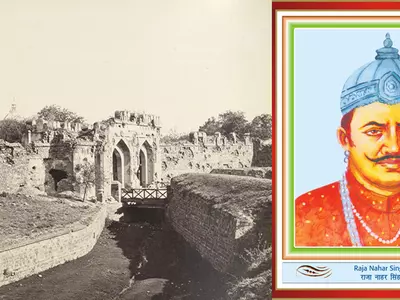The Story Of Raja Nahar Singh - The Unsung Hero Of 1857 Who Guarded Delhi's Freedom For Over 120 Days

Whether it was Mangal Pandey, Rani Laxmibai, Tatya Tope, Nana Saheb, or the last Mughal, Bahadur Shah Zafar - the revolt of 1857 saw many heroes. But alongside these heroes who got credit for scripting the mutiny, there were thousands of others who sacrificed their lives without being sung. One such hero was Raja Nahar Singh, the king of Ballabgarh, Faridabad who guarded Delhi's borders from British forces and kept Delhi liberated for over 120 days. Despite being hanged by the British near today's fountain at Chandni Chowk, not many people know about the sacrifice of this great king whom the British couldn't defeat by force and had to catch by treachery.

bharatmata mandir
In the first war of Indian Independence, on 16th May 1857, when Delhi was liberated, the army of Nahar Singh was on guard on the western border of Delhi. He had established military guard posts from Delhi to Ballabhgarh, and also had his men of intelligence on the ground.
The English called Ballabhgarh, the eastern border to Delhi, "Delhi's gate of Iron" and were fearful of it. They did not have the courage to face him. John Lawrence, the then commissioner of Punjab, had written to the then governor-general, Lord Canning that, "The East and the South is protected by the strong forces of Raja Nahar Singh of Ballabhgarh, and it is unlikely we can break this wall of soldiers unless we receive reinforcements from China or England."
His birth
Nahar Singh was born to Jat King Raja Ram Singh and Basant Kaur at Ballbhgarh on 6th April 1821. Nahar Singh received his education at the feet of his preceptors Pandit Kulkarni and Maulvi Rahman Khan which made him secular in the true manner.

Haryana Tourism
Since his father passed away when he was nine, his uncle Nawal Singh took over the responsibility of running the state affairs till Nahar Singh's coronation in 1839. Prior to this, Nahar Singh received tutorship in martial arts and soon grew to be an adept horse rider and fine shooter. Legend has it that he once single-handedly hunted a lion.
In 1839, Nahar Singh organised a meeting in Mukteshwar (Uttar Pradesh), which was attended by Rao Krishan Gopal, Raja of Gwalior, Tantya Tope and other important people who later participated in the mutiny.
He played an important role in safeguarding Delhi

wikipedia commons
Raja Nahar Singh, who was one of the trusted lieutenants of Bahadur Shah Zafar, played an important role in repulsing successive British attacks on Delhi in the battles of Hindon and Badli-ki-Sarai. The Indian forces defeated the British and further extended Delhi's liberation from the British.
When Delhi fell
While Nahar Singh kept Delhi impregnable from the southern and eastern sides, the British on September 14th, 1857, attacked Delhi from the west and entered from Kashmiri Gate. After a long siege and battle, the British took control of the gated city on 21st September, while the emperor, Bahadur Shah, escaped to the tomb of Humayun, 6 miles away from the gated city.

wikipedia commons
Raja Nahar Singh wanted to bring the emperor to Ballabhgarh, which till then was a stronghold of the rebels. But Mirza Elahi Baksh, the father of the emperor's daughter-in-law, betrayed the emperor. Baksh was an agent of the British, and persuaded the Emperor not to go beyond the tomb. Quite different from the British narrative, that says that Nahar Singh seized Humayun's Tomb. But after British general Hudson killed Bahadur Shah's two sons and threatened to kill the emperor, the siege was lifted.
His capture
Nahar Singh had retired to his stronghold in Ballabhgarh after the emperor was arrested. The British emissaries went to Ballabhgarh with white flags and asked for peace talks which would result in a settlement with the Mughal Emperor.

wikipedia commons
Nahar Singh trusted the British and left for Delhi with 500 horses and troopers. As soon as he entered Delhi, he was ambushed by an English force and captured. His escort soldiers were also butchered mercilessly.
The British general, Hudon, who knew Nahar Singh from previous encounters, offered to spare his life if he apologised to the British Empire for whatever harm he had caused. But like a true patriot, Nahar Singh refused. He was hanged on 9th January, 1858, near the present day fountain in Chandni Chowk.
He was only 35.

























